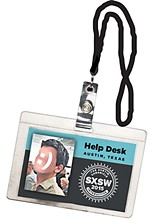Help Desk
A business meeting goes well, but there's no follow-through. "Help Desk" to the rescue.
By Michael Agresta, Fri., Feb. 20, 2015

:( Help!
I'm writing in response to your "First Date Flakeout" column from last month. I have a similar situation, except mine is professional. I was Facebook-introduced to a friend of a friend who "knows everybody" in the Austin tech world. We met for coffee and, I thought, hit it off. At the cafe, he mentioned several people whom I should meet, implying that he would introduce us. Since then, though I've followed up via Facebook and email, I've heard back zilch. It's been three weeks. I think he's blocked me on Facebook Messenger. Meanwhile, I'm still unemployed.
In your column, you wrote that, in the era of online dating, the First Date Flakeout "should be understood for what it is, a gentle 'no.'" You advised against aggressively demanding a response. Given how most people are totally overwhelmed by their online communications these days, should the First Date Flakeout principle be expanded to the professional realm? I.e., is a nonresponse the same thing as a gentle "no"?
– Promised Introductions a No-Go?
The short answer to your question, PING, is no. Romance and business are different beasts. As a rule, we don't recommend equating the two. Otherwise, you might end up with a "work wife" instead of a real one, or turning into a vulture capitalist of the dating world.
Harassment in the online dating world is too common, and too often scary or violent, for us to sympathize with daters who can't take the hint of nonresponsiveness. Hence the First Date Flakeout principle. If you meet a person online, and she's not feeling it enough to take you up on a second date, she doesn't owe you anything — not even an unambiguous "no." It's on you to let it go.
The business world, on the other hand, runs on everyday badgering of a different, nonsexual sort. People bug their clients to make deals, their bosses to give them a promotion or a raise, their employees to work harder or better, and their rivals to gain competitive advantage. We're not suggesting that you harass this friend-of-a-friend, PING. It's possible that he blocked you on Facebook because you were a legitimate nuisance. But it also seems possible, from where we're sitting, that you're taking "no" for an answer a bit too easily.
We recommend a positive approach to online nagging. Social media is an invaluable tool. Appeal to your contact's vanity by liking or sharing his posts or tweets or endorsing him on LinkedIn. Don't inject yourself in his online social life in a disruptive way. Just give him the chance to think, about you, "Oh yeah, that guy. He's all right." Notice his interests and hobbies and, next time you contact him, start off by engaging with something that matters to him.
You're right, he's probably drowning in emails and other forms of online communication. Don't resent him for not getting back to you. Stay friendly, stay positive, and stay patient. What's the worst that could happen? A "no"? You're already there. :) HD








